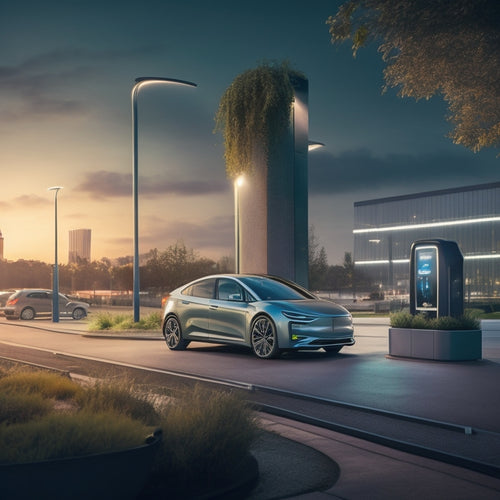
7 Tips for Off-Grid Energy Independence
Share
To achieve off-grid energy independence, you'll need to assess your energy needs, considering seasonal variations and appliance efficiency. Choose the right solar panels based on your energy needs, prioritizing panel efficiency and selecting high-efficiency models from reputable brands. Evaluate battery types, monitoring their health regularly, and select an inverter that meets your energy demands. Guarantee wiring meets electrical codes, implement proper grounding, and prioritize safety precautions. Monitor your system's performance, tracking key metrics like energy output and consumption. Finally, establish a routine maintenance schedule to identify potential issues early; now, take the next step in designing your off-grid energy system.
Overview
- Conduct a lifestyle assessment to determine energy consumption patterns and identify areas for improvement to reduce energy needs.
- Choose high-efficiency solar panels from reputable brands and maintain them regularly for peak energy output and system longevity.
- Select the right battery type based on factors like cycle life, maintenance requirements, cost, and environmental impact, and monitor its health regularly.
- Ensure proper wiring and electrical safety by following electrical codes, implementing grounding techniques, and calculating load accurately.
- Implement a smart monitoring system to track performance, identify areas for improvement, and enable remote management and predictive maintenance.
Assessing Your Energy Needs
Before diving into the world of off-grid energy independence, it's vital to understand your energy needs.
You'll need to conduct a lifestyle assessment to determine your energy consumption patterns. Analyze your usage patterns, considering seasonal variations that may impact your energy demand. Identify areas where you can improve appliance efficiency to reduce your overall energy consumption.
Calculate your total energy consumption in watt-hours (Wh) per day by reviewing past utility bills for historical energy consumption data energy audit.
By doing so, you'll be able to create an accurate demand forecasting model. This will enable you to design an off-grid energy system that meets your unique needs and supports your sustainability goals.
Choosing the Right Solar Panels
You're likely to require a solar panel system capable of producing around 5-10 kilowatts (kW) of power to support your off-grid lifestyle, considering your previously assessed energy needs.
When choosing the right solar panels, prioritize panel efficiency, which can range from 15% to 22%. High-efficiency solar panels from brands like SunPower and Panasonic are recommended for peak performance.
Look for reputable manufacturers offering extensive solar warranties (25-30 years) and competitive installation costs. Proper maintenance is essential; clean panels regularly to guarantee peak energy output.
The environmental impact of solar energy is markedly lower than traditional grid alternatives. A well-maintained system can last up to 30 years or more, providing a reliable source of energy for your off-grid freedom.
Battery Selection for Storage
When selecting batteries for off-grid energy storage, you'll need to evaluate the type of battery that best suits your needs, particularly regarding their ability to provide a consistent energy supply over extended periods deep cycle batteries.
You'll want to compare options like lead-acid, nickel-cadmium, and lithium-ion batteries, assessing their respective advantages and disadvantages, such as the number of cycles they can withstand and their maintenance costs.
Additionally, you'll need to determine the ideal depth of discharge (DOD) for your system, as this will impact the battery's lifespan and overall performance.
Battery Type Comparison
Several key factors determine the suitability of a battery type for off-grid energy storage, including depth of discharge, cycle life, and maintenance requirements. You must consider these factors when choosing a battery type for your off-grid energy system.
| Battery Type | Advantages | Disadvantages |
|---|---|---|
| Lithium-Ion | High energy density, long lifespan, low maintenance | High upfront cost, temperature sensitivity |
| Lead-Acid | Low upfront cost, well-established technology | Low energy density, short lifespan, heavy maintenance |
| Nickel-Cadmium | High discharge rate, long lifespan | Toxic materials, high maintenance, limited recyclability |
| Nickel-Metal Hydride | High energy density, low maintenance | Limited recyclability, high self-discharge rate |
| Flow Battery | Long lifespan, scalable design | Low energy density, high upfront cost |
When selecting a battery type, lithium-ion batteries offer advantages like high energy density and long lifespan, but lead-acid batteries have disadvantages like low energy density and short lifespan. Consider your needs and weigh the cost comparison, environmental impact, and charging efficiency of each option.
Depth of Discharge
How deeply can you drain your batteries before recharging them without compromising their lifespan? This is where depth of discharge (DOD) comes in. A higher DOD means more energy is extracted from your batteries, but it also reduces their lifespan.
For off-grid energy independence, you'll want to strike a balance between energy efficiency and battery longevity. Aim for a DOD of 50% or less to guarantee your batteries last for thousands of discharge cycles.
Proper load management and solar integration are essential to achieving this. By doing so, you'll minimize your environmental impact while meeting your renewable energy goals.
Always follow safety standards and manufacturer guidelines to guarantee your system operates within safe parameters.
Inverters for Efficient Energy
One essential component of an off-grid energy system is the inverter, which converts DC power from your solar panels or wind turbines into AC power for your home.
When selecting an inverter, take into account inverter sizing to guarantee it can handle your energy demands. You'll also need to decide between inverter types, such as string inverters, microinverters, or power optimizers.
Look for inverter features like maximum power point tracking (MPPT) and built-in monitoring for optimized performance. Inverter efficiency is significant, so choose a model with a high efficiency rating.
Proper inverter installation is critical, and you may want to think about hiring a professional. Be prepared for inverter troubleshooting and research reputable brands offering extensive warranties.
Wiring and Electrical Safety
With your inverter in place, it's time to focus on safely distributing the converted AC power to your off-grid home.
You'll need to verify your wiring meets electrical codes and installation standards to avoid electrical shock or fire hazards. Proper grounding techniques are essential, so make certain to follow established guidelines.
Calculate your load accurately to determine the correct wire sizes and circuit protection requirements. Choose wiring methods that accommodate your system's voltage and current ratings.
As you integrate your system, prioritize safety precautions, such as using surge protectors and fuses.
Monitoring Your Energy System
What's the real-time status of your off-grid energy system? You need to know to guarantee energy consumption is optimized.
A smart monitoring system integrates all components, logging data for performance analysis. With real-time analytics, you can identify areas for improvement, making adjustments to maximize efficiency.
Remote management allows you to access your system from anywhere, using a user-friendly interface. Predictive maintenance is possible with trend analysis, helping you stay ahead of potential issues.
Maintenance for Long-Term Reliability
You'll need to establish a routine of regular inspection schedules to identify potential issues before they become major problems.
Monitoring your battery health is also essential, as it directly impacts your system's overall performance and lifespan.
Regular Inspection Schedules
Every off-grid energy system, regardless of its size or complexity, requires regular inspections to guarantee long-term reliability.
You'll need to establish a routine inspection schedule to make certain your system operates safely and efficiently. Develop a maintenance checklist that includes seasonal adjustments, such as cleaning solar panels or inspecting wind turbines.
Regularly inspect components for wear and tear, and have troubleshooting guidelines in place for when issues arise. Consider hiring a professional to assess your system annually to identify potential issues before they become major problems.
Be aware of weather impacts on your system and plan for potential upgrades or efficiency improvements.
Battery Health Monitoring
Monitoring your battery's state of charge and health is essential to maintaining a reliable off-grid energy system, as neglecting this aspect can lead to premature battery failure, reducing the overall system's lifespan. To guarantee energy efficiency and prolong your battery's lifespan, you should regularly monitor its voltage, temperature, and state of charge. This data will help you identify potential issues before they become major problems.
| Parameter | Optimal Range | Action Below Range |
|---|---|---|
| Voltage | 12.4-12.7V | Charge batteries immediately |
| Temperature | 20-25°C | Guarantee proper ventilation |
| State of Charge | 50-80% | Avoid deep discharging |
| Cycle Count | <300 cycles | Plan for replacement |
| Age | <5 years | Schedule maintenance checks |
System Performance Tracking
As you verify your batteries are in top condition, it's equally important to keep a close eye on the overall performance of your off-grid energy system.
You need to track key performance metrics, such as energy output, consumption, and efficiency, to confirm your system is running at peak performance.
Employ data analytics tools to monitor and analyze your system's data, identifying trends and potential issues before they become major problems.
This proactive approach will help you pinpoint areas for improvement, enhance your system's performance, and prevent costly repairs.
Frequently Asked Questions
Can I Mix Old and New Batteries in My Off-Grid System?
When combining old and new batteries, you'll face compatibility issues, affecting charging efficiency. You're risking reduced performance, premature wear, and even system failure. It's best to replace all batteries with identical, new ones to guarantee peak performance and extend their lifespan.
How Do I Deal With Shading on My Solar Panel Array?
When dealing with shading on your solar panel array, you'll want to optimize solar panel orientation and conduct a thorough shading analysis to identify areas of obstruction, then adjust your setup to minimize energy losses and maximize your harvest.
What Is the Recommended Cable Size for My Off-Grid Setup?
You'll want to calculate the recommended cable size for your off-grid setup by considering the voltage drop and cable gauge, ensuring minimal energy loss; a 2/0 AWG or larger cable is often ideal for systems over 5 kW.
Can I Use a Generator as a Backup Power Source?
You're not stuck in the dark ages, and a generator can be a reliable backup power source, but you'll need to prioritize generator maintenance and make certain you've got the right generator sizing to meet your off-grid energy needs - don't get left in the dark!
How Often Should I Check and Add Water to My Batteries?
You'll want to check your battery water levels every 1-3 months, depending on temperature and charging cycles, and top them off as needed to guarantee ideal battery maintenance and prevent damage from dry cells.
Ready to Buy
As you flip the switch on your off-grid energy system, you'll be living like a modern-day pioneer, utilizing the power of the sun to fuel your independence. But don't get too comfortable - regular maintenance is key to ensuring your system runs like a well-oiled machine. Stay vigilant, and you'll be enjoying the fruits of your labor for years to come. Remember, energy independence is not a set-it-and-forget-it affair; it's a long-term commitment to living life on your own terms.
Related Posts
-

Solid State Batteries in Electric Vehicles
Solid-state batteries revolutionize electric vehicles by offering a longer lifespan and higher energy density than tr...
-

Why Outdoor Solar Lighting Systems Are Sustainable
Outdoor solar lighting systems are sustainable because they utilize renewable energy, drastically reducing your carbo...
-
Average Lifespan of Solar Battery Banks
The average lifespan of solar battery banks generally ranges from 5 to 15 years. This variation mainly stems from the...

